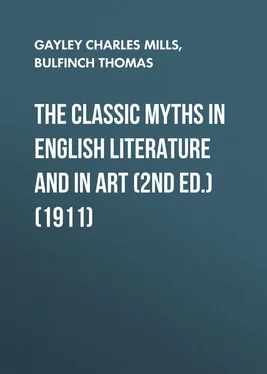Thomas Bulfinch - The Classic Myths in English Literature and in Art (2nd ed.) (1911)
Здесь есть возможность читать онлайн «Thomas Bulfinch - The Classic Myths in English Literature and in Art (2nd ed.) (1911)» — ознакомительный отрывок электронной книги совершенно бесплатно, а после прочтения отрывка купить полную версию. В некоторых случаях можно слушать аудио, скачать через торрент в формате fb2 и присутствует краткое содержание. Жанр: foreign_antique, foreign_prose, на английском языке. Описание произведения, (предисловие) а так же отзывы посетителей доступны на портале библиотеки ЛибКат.
- Название:The Classic Myths in English Literature and in Art (2nd ed.) (1911)
- Автор:
- Жанр:
- Год:неизвестен
- ISBN:нет данных
- Рейтинг книги:4 / 5. Голосов: 1
-
Избранное:Добавить в избранное
- Отзывы:
-
Ваша оценка:
- 80
- 1
- 2
- 3
- 4
- 5
The Classic Myths in English Literature and in Art (2nd ed.) (1911): краткое содержание, описание и аннотация
Предлагаем к чтению аннотацию, описание, краткое содержание или предисловие (зависит от того, что написал сам автор книги «The Classic Myths in English Literature and in Art (2nd ed.) (1911)»). Если вы не нашли необходимую информацию о книге — напишите в комментариях, мы постараемся отыскать её.
The Classic Myths in English Literature and in Art (2nd ed.) (1911) — читать онлайн ознакомительный отрывок
Ниже представлен текст книги, разбитый по страницам. Система сохранения места последней прочитанной страницы, позволяет с удобством читать онлайн бесплатно книгу «The Classic Myths in English Literature and in Art (2nd ed.) (1911)», без необходимости каждый раз заново искать на чём Вы остановились. Поставьте закладку, и сможете в любой момент перейти на страницу, на которой закончили чтение.
Интервал:
Закладка:
Psyche, meanwhile, wandered day and night, without food or repose, in search of her husband. But he was lying heartsick in the chamber of his mother; and that goddess was absent upon her own affairs. Then the white sea gull which floats over the waves dived into the middle deep,
And rowing with his glistening wings arrived
At Aphrodite's bower beneath the sea.
She, as yet unaware of her son's mischance, was joyously consorting with her handmaidens; but he, the sea gull,
But he with garrulous and laughing tongue
Broke up his news; how Eros fallen sick
Lay tossing on his bed, to frenzy stung
By such a burn as did but barely prick:
A little bleb, no bigger than a pease,
Upon his shoulder 'twas, that killed his ease,
Fevered his heart, and made his breathing thick.
"For which disaster hath he not been seen
This many a day at all in any place:
And thou, dear mistress," said he, "hast not been
Thyself among us now a dreary space:
And pining mortals suffer from a dearth
Of love; and for this sadness of the earth
Thy family is darkened with disgrace…
"'Tis plain that, if thy pleasure longer pause,
Thy mighty rule on earth hath seen its day:
The race must come to perish, and no cause
But that thou sittest with thy nymphs at play,
While on the Cretan hills thy truant boy
Has with his pretty mistress turned to toy,
And, less for pain than love, now pines away." 128 128 Robert Bridges, Eros and Psyche.
And Venus cried angrily, "My son, then, has a mistress! And it is Psyche, who witched away my beauty and was the rival of my godhead, whom he loves!"
Therewith she issued from the sea, and, returning to her golden chamber, found there the lad sick, as she had heard, and cried from the doorway, "Well done, truly! to trample thy mother's precepts under foot, to spare my enemy that cross of an unworthy love; nay, unite her to thyself, child as thou art, that I might have a daughter-in-law who hates me! I will make thee repent of thy sport, and the savor of thy marriage bitter. There is one who shall chasten this body of thine, put out thy torch, and unstring thy bow. Not till she has plucked forth that hair, into which so oft these hands have smoothed the golden light, and sheared away thy wings, shall I feel the injury done me avenged." And with this she hastened in anger from the doors.
And Ceres and Juno met her, and sought to know the meaning of her troubled countenance. "Ye come in season," she cried; "I pray you, find for me Psyche. It must needs be that ye have heard the disgrace of my house." And they, ignorant of what was done, would have soothed her anger, saying, "What fault, Mistress, hath thy son committed, that thou wouldst destroy the girl he loves? Knowest thou not that he is now of age? Because he wears his years so lightly must he seem to thee ever to be a child? Wilt thou forever thus pry into the pastimes of thy son, always accusing his wantonness, and blaming in him those delicate wiles which are all thine own?" Thus, in secret fear of the boy's bow, did they seek to please him with their gracious patronage. But Venus, angry at their light taking of her wrongs, turned her back upon them, and with hasty steps made her way once more to the sea. 129 129 The last three paragraphs are from Pater's version in Marius the Epicurean.
And soon after, Psyche herself reached the temple of Ceres, where she won the favor of the goddess by arranging in due order the heaps of mingled grain and ears and the carelessly scattered harvest implements that lay there. The holy Ceres then counseled her to submit to Venus, to try humbly to win her forgiveness, and, mayhap, through her favor regain the lover that was lost.
Obeying the commands of Ceres, Psyche took her way to the temple of the golden-crowned Cypris. That goddess received her with angry countenance, called her an undutiful and faithless servant, taunted her with the wound given to her husband, and insisted that for so ill-favored a girl there was no way of meriting a lover save by dint of industry. Thereupon she ordered Psyche to be led to the storehouse of the temple, where was laid up a great quantity of wheat, barley, millet, vetches, beans, and lentils prepared for food for her pigeons, and gave order, "Take and separate all these grains, putting all of the same kind in a parcel by themselves, – and see that thou get it done before evening." This said, Venus departed and left the girl to her task. But Psyche, in perfect consternation at the enormous task, sat stupid and silent; nor would the work have been accomplished had not Cupid stirred up the ants to take compassion on her. They separated the pile, sorting each kind to its parcel and vanishing out of sight in a moment.
Конец ознакомительного фрагмента.
Текст предоставлен ООО «ЛитРес».
Прочитайте эту книгу целиком, купив полную легальную версию на ЛитРес.
Безопасно оплатить книгу можно банковской картой Visa, MasterCard, Maestro, со счета мобильного телефона, с платежного терминала, в салоне МТС или Связной, через PayPal, WebMoney, Яндекс.Деньги, QIWI Кошелек, бонусными картами или другим удобным Вам способом.
1
See Preface.
2
Supplementary information concerning many of the myths may be found in the corresponding sections of the Commentary. For the pronunciation of names see Index, and Rules preceding the Index.
3
So far as possible, Latin designations, or Latinized forms of Greek names, are used.
4
On the Titans, etc., Preller's Griech. Mythol. 1, 37.
5
On signification of Uranus, Cronus, Zeus, see Preller, 1, 37, 38, and Commentary, §§ 4, 24.
6
Roscher, Ausf. Lex., Article Giganten [J. Ilberg].
7
The name more probably signifies Brandisher [of the Lance].
8
Consequently the creation of these men could not be assigned to Prometheus, – unless they were made by him before the war of the Titans.
9
There is uncertainty as to the mythical period of these events. The order here given seems to me well grounded. Hes. Works and Days, 180; Theog. 790-910.
10
§§ 156, 161, 191 and Commentary, § 10.
11
From Herakles, a drama by George Cabot Lodge.
12
From Byron's Prometheus. See also his translation from the Prometheus Vinctus of Æschylus, and his Ode to Napoleon Buonaparte.
13
Prometheus, or The Poet's Forethought. See Commentary.
14
Compare Byron's political satire, The Age of Bronze.
15
Oracles, see §§ 24, 30, and Commentary.
16
Consult, in general, corresponding sections of the Commentary.
17
Symbolized on earth by Mount Olympus in Thessaly.
18
Cowper's translation.
19
See Commentary, § 23, for Gladstone's latest utterance on the number of the Olympians.
Читать дальшеИнтервал:
Закладка:
Похожие книги на «The Classic Myths in English Literature and in Art (2nd ed.) (1911)»
Представляем Вашему вниманию похожие книги на «The Classic Myths in English Literature and in Art (2nd ed.) (1911)» списком для выбора. Мы отобрали схожую по названию и смыслу литературу в надежде предоставить читателям больше вариантов отыскать новые, интересные, ещё непрочитанные произведения.
Обсуждение, отзывы о книге «The Classic Myths in English Literature and in Art (2nd ed.) (1911)» и просто собственные мнения читателей. Оставьте ваши комментарии, напишите, что Вы думаете о произведении, его смысле или главных героях. Укажите что конкретно понравилось, а что нет, и почему Вы так считаете.












